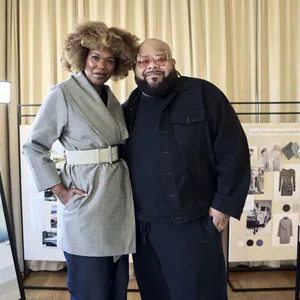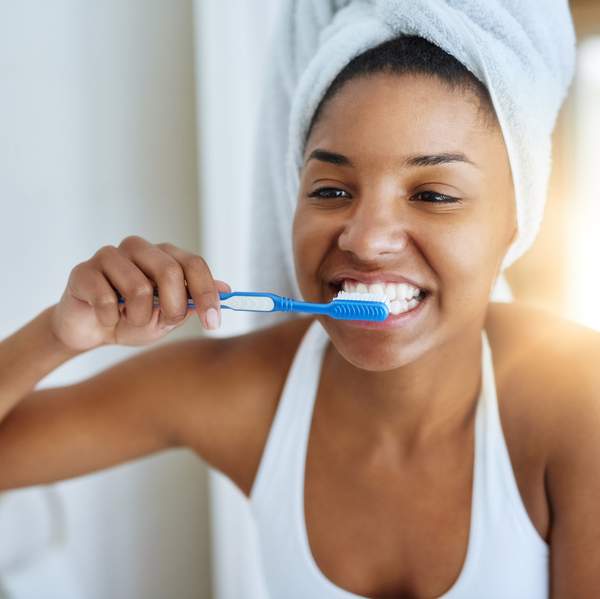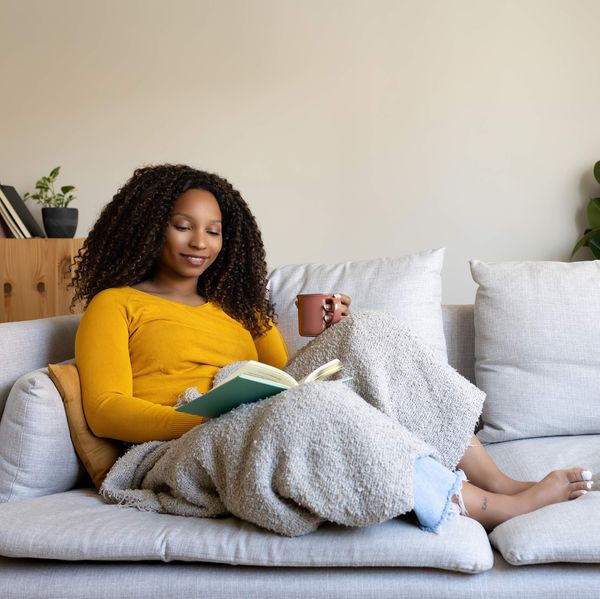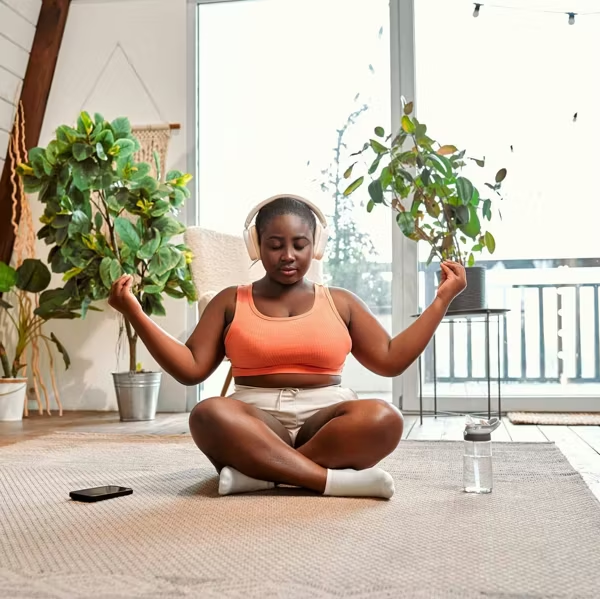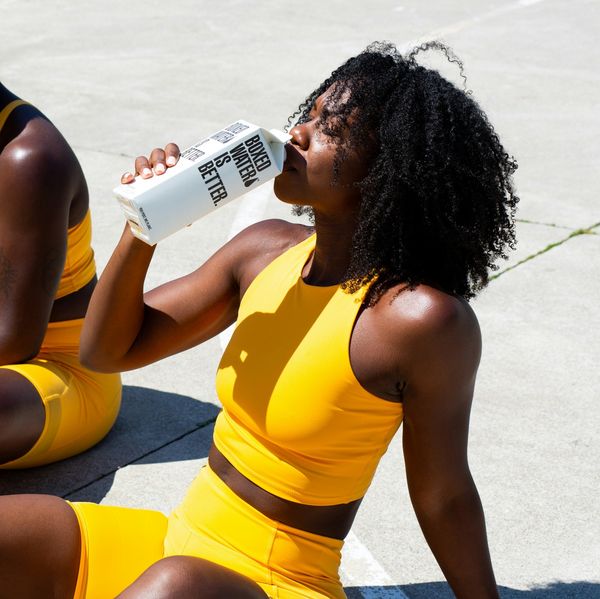When you were growing up, I'm thinking it's pretty safe to assume that you were taught to brush and floss your teeth after every meal. Now that you're grown, be real—do you still do that? After each and every meal? While we're on the subject, do you also brush for no less than two minutes? Each and every time?
I did some digging around and it would appear that only 44 percent of men and 37 percent of women actually brush at least twice a day and 30 percent of us floss every day. This means there are millions out of us out here who are on the way to having weak teeth, dingy enamel and stank breath (if we don't have these things already). And let's not even get into how many of us don't see the dentist as much as we should (word on the street is it's 1 out of every 3 three who skip out on annual visits).
Once our big girl teeth come in, we're not going to get another set. That's why it's imperative that we're as proactive about caring for our biters. Yes, this should include brushing, flossing and taking that semi-dreadful visit to the dentist every year. But it also includes doing some things at home that will help to make our teeth stronger and whiter too.
10 All-Natural Teeth Whitening & Strengthening Tips
1.Baking Soda and Hydrogen Peroxide
Not all of us have sparkling white teeth. Not because we don't take good care of them, but because they aren't a part of our genetic make-up. But if the enamel on your teeth is dingier than normal, it could be due to consuming lots of coffee and soda, eating too much sugar, breathing through your mouth instead of your nose (dry mouth leads to more bacteria), long-term antibiotic use and aging.
A way to get your teeth back bright again? Brushing them with a mixture of baking soda and hydrogen peroxide. The baking soda is effective because the grittiness of it serves as a kind of tooth exfoliant. Also, the bicarbonate that's in the soda helps to balance out the acids that can sometimes cause oral bacteria to thrive, ultimately leading to gingivitis and bad breath. Hydrogen peroxide whitens teeth due to its ability to penetrate past your teeth's enamel so that it can lighten the discoloration that keeps them from gleaming.
Here's a heads up—I know for a fact that the combo works really well. But because it's also pretty abrasive on teeth, it's best to only brush with this kind of paste no more than a couple of times a week. Otherwise, eventually, you could wear some of your enamel down. And enamel isn't something you can simply "get back".
2.Teeth Strengthening Foods
All of us want to have healthy teeth, but not all of us know what the signs of those are. When your teeth are strong and white—your gums won't bleed (including when you brush them), your breath will be fresh (which is why you should floss after every meal), your teeth won't shift, your gums won't recede and your tongue will be a healthy shade of pink (make sure to brush your tongue, by the way!).
No matter what you may put on your teeth, it's still important that you take care of them from the inside out. One of the best ways to do that is to consume foods that are proven to keep your teeth nice and strong. Ones that are high in calcium (like cheese and yogurt), high in magnesium (like leafy greens and pears), full of live probiotic cultures (like sauerkraut and kefir) and loaded with antifungal, antiviral and antibacterial (like garlic), along with bone broth and butter.
Speaking of butter, it is loaded with vitamins A, vitamin D, and vitamin K2. Some people love it so much when it comes to taking care of their teeth that they even brush with it (pastured, cultured butter is best)!
3.DIY Mouthwash
Alcohol, fluoride, sodium saccharin, sodium lauryl sulfate and cetylpyridinium chloride are just five of the ingredients that are listed on the label of a lot of commercial mouthwash brands. What do they all have in common? They're toxic.
Deciding to make your own mouthwash so that you're able to control the kind of ingredients that are in it is one good reason to do it. Another is because, when you put ingredients in it like calcium carbonate and concentrated trace minerals liquid powder, not only can they help to remineralize your teeth (which is great if your teeth are showing the beginning signs of tooth decay), it can help to whiten your teeth too. You can try a really great DIY mouthwash recipe here.
4.Strawberries
Strawberries taste great (especially when they are in season which is April through June)! So great that it's kind of a trip how many nutritional benefits they contain. Eating a fresh bowl of strawberries a couple of times a week provides you with lots of antioxidants, potassium, and fiber. Strawberries also have the ability to do everything from improving the health of your heart and fighting precancerous cells to strengthening your eyes, giving your immune system a boost and reducing your blood pressure.
Know what else strawberries can do? Whiten your teeth! Although strawberries are really red in color, they contain a tooth-whitening enzyme called malic acid. It, plus the seeds that are on the strawberries, help to basically exfoliate the stains off of your teeth.
The best way to use strawberries is to mush 1-2 of them and a half teaspoon of baking soda to it. Then brush your teeth like normal, making sure to rinse thoroughly when you're done. It's effective but try not to do this more than once a week; the acid and the baking soda could eventually become too strong for your teeth if you do it more than that.
5.Green Tea
Green tea is loaded with antioxidants, polyphenols (a compound that reduces body inflammation) and EGCG (Epigallocatechin Gallate), which is a compound that fights off disease. That's not all. The amino acid L-theanine that's in the tea helps to improve your brain function, the caffeine that's in it can increase your metabolism and burn fat and some studies even reveal that green tea can boost longevity.
The crystalline compound known as catechins that's also in green tea is great for oral health. That's because it kills the kind of bacteria that causes the flu and streptococcus mutans—a bacteria that results in tooth decay and cavities. So yeah, drink up.
6.Phosphorus
Phosphorus is the kind of mineral that a lot of us don't give much thought to, but it's very essential to our overall health and well-being. It assists with bone growth, eliminates toxins, reduces fatigue, helps to prevent arthritis, repairs cells, balances hormones and supports tooth enamel too.
You can take phosphorus as a supplement. But unless you've got an illness, probably the best way to get this mineral into your system is to consume foods that contain a good amount of it. Some of those include mushrooms, quinoa, oatmeal, yogurt, salmon, cheese, tuna, potatoes (with the skin on), cheese and even (cooked) waffles.
7.Oil Pulling
If you've never done a little oil pulling before, try it sometime. Out of all of the things that I shared, I can definitely vouch for how clean this process will make your teeth feel! Oil pulling is an Ayurvedic medicine practice that consists of putting a little coconut, sesame or even sunflower oil into your mouth and swishing it around for about 10-15 minutes before spitting it out. It works so well because these kinds of oils have the ability to remove plaque and toxins without damaging your teeth in the process.
Out of all the oils you can try, organic coconut oil is my preference, thanks to the antibacterial and anti-inflammatory properties that are in it. Just make sure to NOT spit the oil out into your sink (it could clog it up over time; use your trash can instead) and that you rinse thoroughly with warm water and brush your teeth immediately following the oil pulling process. That will get rid of any oil residue that's left behind.
8.Orange Peels
The next time you decide to peel an orange, rather than throwing its skin away, eat it. No, seriously! There's plenty of research to support that orange (and lemon) peels contain a flavonoid called hesperidin that will strengthen your immune system, help your body to digest food quicker and easier, protect your respiratory system, increase weight loss and yep, you guessed it—improve your oral health.
First, chewing down on orange peels will whiten your teeth and freshen your breath. As a bonus, it can also decrease teeth sensitivity over time too. Just always keep in mind that due to the high acidic content that are in the peels, you should only do this 1-2 times a week and you should also rinse your mouth out with water right after you do it. Otherwise, you could eventually end up weakening the enamel that's on your teeth.
9.Clove Oil
Do your entire body a favor and, the next time you're at Wal-Mart (or you're perusing Amazon), cop a couple of bottles of clove oil. It's got quite a bit of manganese oil in it (30 percent of your reference daily intake). This is relevant because manganese is a mineral that regulates blood sugar levels, fights PMS symptoms, balances the thyroid, boosts vitamin absorption and even helps to prevent epileptic seizures (which usually come on, in part, by a low level of manganese in one's system).
As far as your teeth and gums go, manganese also helps to keep your teeth healthy and strong. Plus, its potent antibacterial properties are one of the best ways to kill the bacteria that cause gum disease. Also, if you've got a toothache or even a cavity that you can't get immediately treated by your dentist, nothing is quite as soothing as clove oil. It's strong (and that's a major understatement), but I've used it before to relieve pain and it provides an almost immediate numbing sensation that helped me to get an uninterrupted night of sleep. (If you've ever had a toothache before, you know just how much of a blessing that is!)
10. Kissing
A kiss from a great kisser is like nothing else on this earth! And while most of us like to focus on the physical sensation and emotional connection that it provides, let's talk about another thing that is happening every time we share a smooch—all of the spit that is going back and forth.
Since our mouths are, hands down, the dirtiest part of our bodies, that's something to think about before you let someone put their tongue down your throat (just sayin'). But once you know your partner's oral hygiene is on the up and up, their extra saliva getting into your mouth will actually help to kill bacteria, wash away debris and raise calcium, fluoride and phosphate ions while producing disease-fighting bacteria that keeps gingivitis at bay.
Pretty crazy, huh? Yet just one more reason to pucker up, just as soon as you can!
Featured image by Getty Images.
Related Articles:
Real Women Share How They Learned To Embrace Their Gap Teeth - Read More
Cardi B's Dentist Dr. Catrise Austin Built An Empire On Celebrity Smiles - Read More
Love On Yourself With These 7 All-Natural DIY Vaginal Washes - Read More
- Cardi B's Dentist Dr. Catrise Austin Queen of Smiles Feature ... ›
- How To Take Care Of Your Teeth - xoNecole: Women's Interest, Love, Wellness, Beauty ›
- Does Oil Pulling Really Work? Here's What Science Says. - xoNecole ›
- Restore Teeth Enamel Reverse Cavities And More Naturally - xoNecole ›
- 10 Natural Ways to Whiten Teeth at Home - YouTube ›
- 3 natural ways to whiten teeth, according to a dentist | Well+Good ›
- How to Naturally Whiten Your Teeth at Home In 3 Minutes - YouTube ›
- 14 Easy Ways to Naturally Whiten Teeth at Home Today - Bren Did ›
- DIY 10 Home Remedies To Whiten Teeth - YouTube ›
- 4 Natural Teeth Whitening Options That Work | Wellness Mama ›
- Teeth Whitening Slideshow: How to Do It Naturally ›
- How to whiten your teeth naturally: 6 home remedies ›
- The Only All-Natural Teeth Whitening Methods I Recommend ›
- Whiten Your Teeth Naturally & Safely: 6 Easy Ways - Dr. Axe ›
- 7 Simple Ways to Naturally Whiten Your Teeth at Home ›


